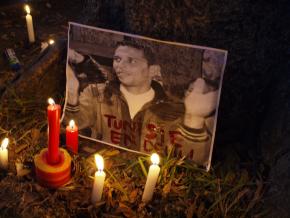Democracy on the West’s terms
Irish socialist says the West claims to want "democracy" for all, but only under the auspices of the particular regimes that it backs.
"WE ARE selling arms to South Africa / Taking holidays in Spain / And Mad-ame Nhu is burning monks in the Holy Father's name / Time to choose."
Readers of a certain age will spot the references. Millicent Martin sang the song on the 1960s satirical show That Was The Week That Was.
"The Dragon Lady," Madame Nhu was the fiercely Catholic First Lady of Vietnam, where a number of Buddhist monks had lately immolated themselves in protest against the torture and repression with which the regime maintained its grip on power. I can still sing the first couple of verses.
I remember student Jan Palach, too, who in 1969 burned himself to death in Wenceslas Square in Prague to focus the world's attention on the Soviet occupation of Czechoslovakia. I recall placards reading "Remember Jan Palach," possibly on student marches here, certainly at demos outside the Soviet embassy in London.
Will Mohamed Bouazizi mean anything at all half a century ahead? Who recognizes his name even now? Bouazizi killed himself by self-immolation in the Tunisian town of Sidi Bouzid last month after the paramilitary police of dictator Zine El Abdine Ben Ali smashed up his informal vegetable stall--his family's only means of support--in revenge for his involvement in mildly anti-government activity while recently at Tunis University.

His death unleashed the wave of strikes and demonstrations which has driven Ben Ali, after 23 years of ruthless rule, out of power and into exile in Saudi Arabia.
Democracy beckons like spring. In Egypt, Saudi Arabia, Libya, Jordan, Syria and Yemen, regimes generally fearful of the will of the people are twice-terrified now at the prospect of a new democracy movement spreading. And yet the voices of Western commentators, and even more so of governments, are hardly raised high from the rooftops in celebration. The European Union, for example, hasn't moved rapidly to offer Tunisia economic aid, or even trade on better terms if democracy is allowed to take hold.
They say they want democracy in the Middle East. They invaded a secular Arab nation, predictably sharpening sectarian feeling and causing untold suffering in a drive, so they claimed, to end dictatorship and usher in democracy.
Tony Blair maintained the same line at the Chilcot inquiry in Britain last week, declaring that, in a similar set of circumstances, he'd do it all over again. They want democracy, sure, but only if they can be certain the people will vote for parties which promise to conform to the dictat of Blair and his ilk.
AT A recent gathering in Belfast to welcome John Ging, head of the UN mission in Gaza, a number of those present seemed genuinely to find it difficult to accept that Hamas had won the election in Gaza and the West Bank in 2006, handily defeating the Palestinian Authority favored by the U.S. and the European Union.
Literally within 24 hours, the U.S. and the EU announced not only that they wouldn't recognize a Hamas government, but would impose sanctions on any part of Palestine--Gaza, for example--which accepted the election result.
Blair, ludicrously a "peace envoy" to the Middle East, refuses to meet with Hamas. Similarly, it has become problematic to argue in even reasonably well-informed circles that Hezbollah is a broad formation with more popular support in Lebanon than any rival party, so routinely is the movement represented as terrorist not only in political communiqués, but in news reports in mainstream media.
The fear is of Islamism. But the denial of democracy for any such reason serves to increase the likelihood of Islamist advance. It is by no means merely a Muslim phenomenon that the absence of an outlet for the will of the people leads many to take refuge in religion.
Does any pro-Western regime, or any significant outside power, seriously want democracy across the Arab world? Freedom of speech and religion, the right to form political parties and trades unions, that sort of thing? In Saudi Arabia, Egypt, Jordan and so forth?
There's scant evidence that this is the case. But it's Islam which is held out as inherently undemocratic. We will know that the West's determination to prevent democracy rippling across the region is waning when the name of Mohamed Bouazizi trips readily off the tongue and his face has become an icon for a willingness to die in the service of freedom for all.
First published at the Belfast Telegraph.


